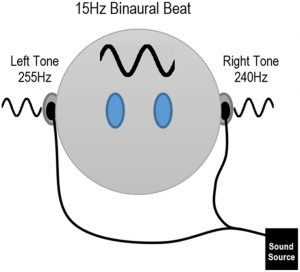Everyone wants to excel at work; for instance, students want to ace their exams, and program developers want to finish their projects on time. What if there is a simple way to help enhance your work performance? Wouldn’t that be awesome?
According to Beauchene and her team, listening to binaural auditory beats has a significant effect on information transfer and visuospatial working memory.
But what is a binaural auditory beat? Here is a clip of a 15 Hz binaural beat:
A binary auditory beat occurs when one hears two tones with different frequency on each ear and perceives as a single tone with frequency of the difference between two tones. So the beat you heard from the clip above, being 15 Hz, means you were listening to two beats with frequency difference of 15 Hz.

Fig 1. Example of a 15 Hz Binaural Beat
To find out what type of binaural beats has the most effect on brain activity, Beauchene and her team carried out an experiment on a group of participants. They were provided with 6 different conditions: 3 with either no beats, pure beats, or classical beats, and 3 with different types of binary beats (5 Hz, 10 Hz, and 15 Hz). They were also given a working memory task – a delayed match-to-sample visuospatial task – to carry out while under 6 different conditions.

Fig 2. Delayed match-to-sample visuospatial working memory task
The electroencephalogram (EEG) recordings were taken while the participants performed the experimental tasks for data analysis.
It turns out that the participants who listened to 15 Hz binaural beats had the most accurate performance in working memory task, compared to any other conditions. As shown in the graph below, there was a 3% increase in Δ Accuracy over 5 minutes for participants who listened to 15 Hz binaural beat, while all other beats made negative changes.

Fig 3. Δ Accuracy
In addition, Beauchene says listening to 15 Hz binaural beats showed “the least change in network connection strengths between the maintenance and retrieval portions of the working memory trials.” This tells how the networks were better preserved throughout the working memory task while they were under the condition of 15 Hz binaural beats.
Beauchene’s team concludes listening to the 15 Hz binaural beats is effective in retrieving better and more accurate memory. This answers the question in the beginning – yes, there is an easy way to augment your work performance. So why don’t you give it a try listening to the 15 Hz binaural beats while studying for the next exam? Who knows, it could boost up your marks by helping you memorize more easily yet accurately.
-Clair Yoon
